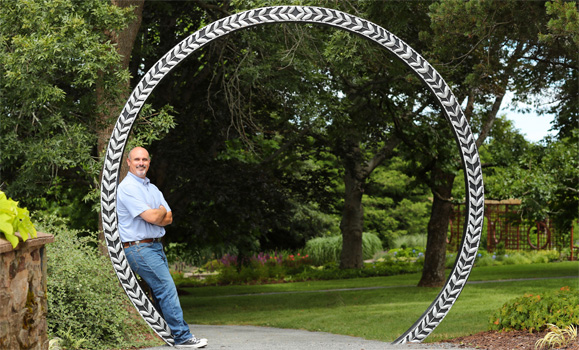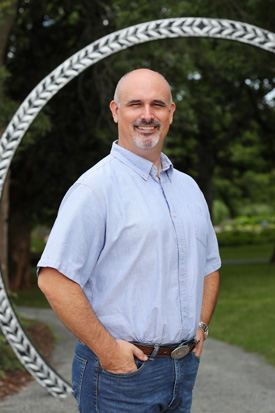This article is part of a series shining a spotlight on the personalities and priorities of Dal's senior leadership team. Revisit previous profilesÃ˝at the Leadership and Vision website.
It was the influence of a high school biology teacher that charted the course for David Gray into academia and a career in marine biology ‚Äî but not without a change in flight plan.Ã˝Ã˝ Ã˝
‚ÄúI wanted to be a fighter pilot,‚Äù he says.Ã˝ ‚ÄúI went to RAF Air crew selection and got through and they told me to go off to university and study something I enjoyed doing and then come back to them once I‚Äôd finished my degree.‚Äù
Ã˝
David studied Marine Biology at the University College of North Wales, Bangor in the School of Ocean Sciences and discovered his passion for the ocean.Ã˝ It was also at this time that the Gulf War had broken out in Saudi Arabia.
“I remember seeing the footage of the tornado pilots that had been shot down in the Gulf and decided that perhaps that wasn’t the career for me and perhaps marine biology and academia was the more natural choice.”

Although David chose to remain grounded, he has been fortunate to travel all over the world as his career has unfolded. He was offered a scholarship to study at Rhodes University in South Africa for his doctoral degree where he met his wife Janine. Another scholarship led him to the University of Hong Kong and the Swire Institute for Marine Sciences to undertake research on the biological clocks and endogenous rhythms of limpets or aquatic snails — hence his twitter handle . He also spent time in the Falkland Islands and Sea Lion Island as a Wildlife ranger eventually landing in the Shetland Islands.
‚ÄúAcademia is a career that provides us with an opportunity for travel.Ã˝ My career has allowed me to travel all over the world. I‚Äôve been very fortunate.‚Äù
Coming to Dal
David credits his high school biology teacher, Mr. Cheshire as a mentor in fuelling his desire for academia and in particular science.Ã˝ Ã˝
‚ÄúMr. Cheshire made science so interesting,‚Äù says David. ‚ÄúHe met students at their levels and kept them interested. I went back to see him when I received my PhD and thanked him for what he‚Äôd done. He knows.‚Äù Ã˝
While David was director of the NAFC Marine Centre at the University of the Highlands and Islands in the Shetland Islands, the position of dean and campus principal at the Faculty of Agriculture became available.
“I knew the reputation of Dalhousie as a marine biologist and from my time as Dean at Hartpury College,” he explains. “At Hartpury, we used the NSAC as our international benchmark so I knew the NSAC really well also. When I heard the two of them were coming together, it sounded like an exciting opportunity.”
That was six years ago. David was recently renewed for a second five-year-term as dean and principal.
Supporting the Truro campus
While his first five-year term was focused on leading the Faculty through its transition into pilipili¬˛ª≠, two fires on the small 200-hectare campus have added an additional burden. A fire in the Ruminant Animal Centre Feed Storage area in 2015 and another in Cox Institute this past summer have deferred priorities.
“My immediate priority really is to get the campus back to full operation after the Cox fire last June that’s obviously a major focus and supporting our researchers in getting their research programs up and running again as quickly as possible whilst minimizing any potential disruption to our students,” he says.
“The other priority is positioning the Faculty to align our strategic direction with the UN Sustainable Development Goals for the next five years and particularly focusing in on global food security… [and] embracing and helping to move forward our equity, inclusivity and diversity agenda as well is always at the forefront.
 On remaining in the classroom…
On remaining in the classroom…
“That’s what I love doing. I came into academics because I enjoyed teaching and I enjoy interacting with students, I always look for any opportunity to get into the classroom. I just love it. I think you need to be there as an administrator because you need to know and understand what your faculty and students are experiencing on a day-to day basis. Things change, technology changes, situations change… being in the classroom keeps me up-to-date and keeps me close to the students and we are very lucky on this campus – we aren’t a huge Faculty and there are very few deans that have the luxury of knowing most of their students by name I’m very lucky to be able to say that I can do that. And for them to chat to me as well.”
On his position as Dean…
“The Dean is the academic lead of the Faculty and I see it as a position that allows me to enable our faculty to deliver high quality teaching and courses and also undertake world leading research. It is also a position that really focusses in on enhancing and ensuring there is a good student experience and I think a Dean needs to lead by example - and set a good example not just for the faculty and the students but for the community at large as well. I wouldn’t, as Dean, ask anyone to do something that I’m not prepared to do myself.”
On the agricultural industry…
There isn’t another sector that impacts our lives, both individually and collectively, more than agriculture. It is our future, it’s that simple.”
Five questions
What’s your favourite hobby or pastime?
Music. I play a number of instruments but my favourite is tuba. I play seven instruments actually… trumpet, tuba, keyboard, trombone, drums, recorder and guitar — a one-man band!
If you were to leave academia and go into any career you wanted, what would you choose?
Working with children with special needs. I couldn’t be a pilot now as I wouldn’t fit in the cockpit. I used to volunteer at a school for handicapped children. I thoroughly enjoyed it. I would get a lot of satisfaction from that.
What’s your go-to snack?
Cornish pasty or Cornish meat pie. The Best British Grub on Prince Street in Truro uses my recipe. It’s the best.
If you could have dinner with one person – living, deceased or fictional – who would it be and why?
I’ve had tea with Archbishop Desmond TuTu of South Africa. He was a major player in the anti apartheid movement. Fantastic man, really nice guy. He laughs constantly and is so joyful. He was at a convocation ceremony and I was in the band and he actually came over and sat next to me with his tea and chatted with me. Otherwise, I’d have dinner with Captain Malcom Reynolds, captain of the Serenity in Firefly. Actually we’d likely have a beer at a brown coat bar. I’ve always been into science fiction. I grew up with Doctor Who. I remember being young and being scared stiff of it and watching it from behind the sofa.
What’s the best advice you’ve ever received?
Always make sure the shower curtain is inside the bath.

